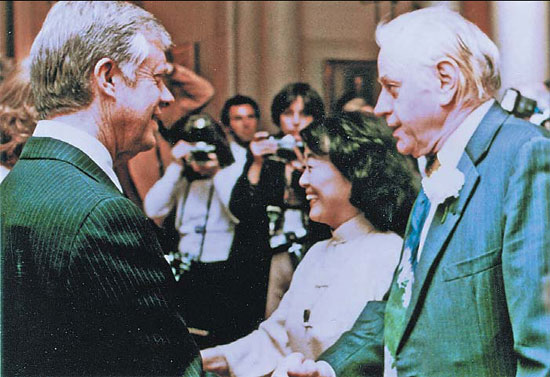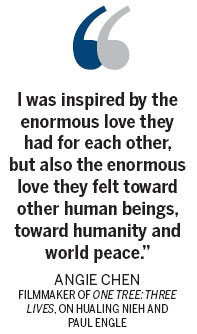
 'Taken 2' grabs movie box office crown
'Taken 2' grabs movie box office crown
 Rihanna's 'Diamonds' tops UK pop chart
Rihanna's 'Diamonds' tops UK pop chart
 Fans get look at vintage Rolling Stones
Fans get look at vintage Rolling Stones
 Celebrities attend Power of Women event
Celebrities attend Power of Women event
 Ang Lee breaks 'every rule' to make unlikely new Life of Pi film
Ang Lee breaks 'every rule' to make unlikely new Life of Pi film
 Rihanna almost thrown out of nightclub
Rihanna almost thrown out of nightclub
 'Dark Knight' wins weekend box office
'Dark Knight' wins weekend box office
 'Total Recall' stars gather in Beverly Hills
'Total Recall' stars gather in Beverly Hills
A life of letters
Updated: 2013-02-05 11:05
By Kelly Chung Dawson (China Daily)
|
||||||||
 |
|
US President Jimmy Carter greets novelist Hualing Nieh and her husband, Paul Engle, a fellow writer, at a White House reception. Photos provided to China Daily |
"I deeply admire the spirit in which Paul and Hualing founded the IWP," Chen says of her decision to tell the couple's story. "I was inspired by the enormous love they had for each other, but also the enormous love they felt toward other human beings, toward humanity and world peace.

"This writing program was and is a platform for people all over the world with different ideas and beliefs to come together, fight it out among themselves to reach an understanding and ultimately take that back to their original countries. That seed is sown."
Christopher Merrill, the current IWP director, says the impact of Nieh and Engle's endeavor is far-reaching.
"They went out and made it happen," he says. "The effect has been that for 45 years, we've hosted some of the greatest writers in the world in a truly unique environment, where the written word is taken really seriously. These writers get to know one another fairly intimately, and they also get to know the literatures of a great many countries.
"Not only are there occasions for collaboration, but more to the point they have these chances to break down their stereotypes of what a Chinese writer, or an Indian writer, is, and what literature in South Africa might be about.
"They have primary contact with living writers from a diverse range of countries, and it's difficult to imagine them leaving without larger ideas of what writing really is. They leave realizing they have more in common than what divides them. That's the beauty of what they created."
In 1976, Nieh and Engle were nominated for a Nobel Peace Prize for their work with the IWP.
However, the program has never been intentionally diplomatic in nature, Chen says. "Writers are not politicians. We deal with each other as individuals and as friends. We may argue out of curiosity, but never out of animosity," the filmmaker says.
She recounted the story of an Israeli couple who at first refused to speak to a fellow IWP participant from Germany. The German writer persisted and by the end of the semester had been invited to visit the Israelis in their land.
In the film, Engle says: "If you are reading poetry to each other, you are not fighting each other."
In 1979, Xiao Qian became the first writer from the Chinese mainland to join the program.
That year, Nieh and Engle organized a Chinese writers' weekend, in which Xiao and about 40 writers discussed Chinese literature.
"Everyone was so excited and overjoyed at this opportunity to talk with Chinese writers," Nieh recalls.
That sense of community and connection is at the heart of IWP, according to Merrill.
"The basic idea of the program is a group of writers gathering around a table and trading stories and ideas, and breaking bread," he says.
Nieh is incredibly generous, he adds. "It's important to remember that at the heart of all this, is a great writer who wanted to share her good fortune with writers from around the world.
"That's what writers, even at their most solitary, are doing: They are communicating with readers. That form of connection is at the heart of what Hualing, and this film, are about."
Contact the writer at kdawson@chinadailyusa.com.
|
 |
 |
 |
Most Viewed
Editor's Picks

|

|

|

|

|

|
Today's Top News
Boston bombing suspect reported cornered on boat
7.0-magnitude quake hits Sichuan
Cross-talk artist helps to spread the word
'Green' awareness levels drop in Beijing
Palace Museum spruces up
First couple on Time's list of most influential
H7N9 flu transmission studied
Trading channels 'need to broaden'
US Weekly

|

|








